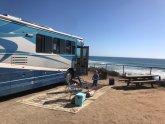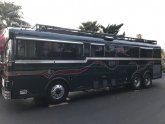aippolito184
New Member
- Joined
- Aug 8, 2020
- Messages
- 37
I was hoping to get a reality check on some ideas and ask a couple of questions. This is the first post I have done a lot of reading but maybe not enough!
Battery
The most important thing I need to do right now is to select and budget components. The battery is the biggest question, my priorities are:
1. Safety- myself, my wife and my 2 & 4 yo children will be on this bus sleeping full-time for a 2-year adventure.
2. Cost - would like to spend as little as possible but I need a lot of capacity, I am however willing to give up space and baby them (temp control) I am also willing to build my own battery.
I am thinking a higher voltage battery system (48V?) is better? Lower amps, less cabling costs, and higher efficiency?
I have watched a few videos with high power systems that are powered by LEAF batteries. They seem cheap but I have watched enough of Will's videos to know he is against them. Why? What are the drawbacks if I don't need 1c discharge just a lot of capacity?
If I build my own cell should I incorporate spaces? I hear a lot of talk about temp control but if you put a nut spacer between each cell and forced air through an inclosure the batteries would stay cool? I was planning to alternate the spaces if there are multiple stacks for more efficiency of cooling.
Panels
I would like to pack every watt up there I can but don't want to waste money if I can capture all the power I'm receiving. Power density would be nice to free up space for a roof deck or something cool. Also, durability is a concern. Does anyone have genius recommendations?
Inverter (s?)
I am thinking of a lot of AC appliances, two AC units, stackable washer dryer, dishwasher, fridge, stove& oven. Should they be on different inverters to save battery? Always on items on one and then each of the others on their own. Or is it better to group them up to a certain capacity (ie 3kW each)?
Sorry for the rambling nature and if any of these were easily searchable.
Anthony
Battery
The most important thing I need to do right now is to select and budget components. The battery is the biggest question, my priorities are:
1. Safety- myself, my wife and my 2 & 4 yo children will be on this bus sleeping full-time for a 2-year adventure.
2. Cost - would like to spend as little as possible but I need a lot of capacity, I am however willing to give up space and baby them (temp control) I am also willing to build my own battery.
I am thinking a higher voltage battery system (48V?) is better? Lower amps, less cabling costs, and higher efficiency?
I have watched a few videos with high power systems that are powered by LEAF batteries. They seem cheap but I have watched enough of Will's videos to know he is against them. Why? What are the drawbacks if I don't need 1c discharge just a lot of capacity?
If I build my own cell should I incorporate spaces? I hear a lot of talk about temp control but if you put a nut spacer between each cell and forced air through an inclosure the batteries would stay cool? I was planning to alternate the spaces if there are multiple stacks for more efficiency of cooling.
Panels
I would like to pack every watt up there I can but don't want to waste money if I can capture all the power I'm receiving. Power density would be nice to free up space for a roof deck or something cool. Also, durability is a concern. Does anyone have genius recommendations?
Inverter (s?)
I am thinking of a lot of AC appliances, two AC units, stackable washer dryer, dishwasher, fridge, stove& oven. Should they be on different inverters to save battery? Always on items on one and then each of the others on their own. Or is it better to group them up to a certain capacity (ie 3kW each)?
Sorry for the rambling nature and if any of these were easily searchable.
Anthony








